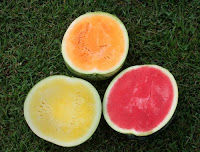 A study from the University of Kentucky and Purdue University showed that mice fed a diet including watermelon juice had lower weight, cholesterol and arterial plaque than a control group. The findings, reported in the Journal of Nutritional Biochemistry, suggest that citrulline, a compound found in watermelon, plays a role in cardiovascular health. "We were interested in citrulline because previous studies showed that it may lower blood pressure," Shubin Saha, a Purdue Extension vegetable specialist and study co-author, told Medical Xpress. "We didn't see a lowering of blood pressure, but these other changes are promising."
A study from the University of Kentucky and Purdue University showed that mice fed a diet including watermelon juice had lower weight, cholesterol and arterial plaque than a control group. The findings, reported in the Journal of Nutritional Biochemistry, suggest that citrulline, a compound found in watermelon, plays a role in cardiovascular health. "We were interested in citrulline because previous studies showed that it may lower blood pressure," Shubin Saha, a Purdue Extension vegetable specialist and study co-author, told Medical Xpress. "We didn't see a lowering of blood pressure, but these other changes are promising."The report explained that "the researchers fed two groups of mice diets high in saturated fat and cholesterol. Half the mice received water containing 2 percent watermelon juice, while the others received the same amount of water supplemented with a solution that matched the carbohydrate content of the watermelon juice. The mice that consumed watermelon juice gained about 30 percent less weight than the control group and had about 50 percent less LDL cholesterol - the so-called bad cholesterol. The experimental group also had about a 50 percent reduction in plaque in their arteries, as well as elevated levels of citrulline." Sibu Saha, a professor of surgery at the University of Kentucky, explained that the researchers are not sure at what molecular level the citrulline is working, but that's their next step.
Shubin Saha was excited about the dual benefit of the findings. "Twenty percent of each year's watermelon crop is wasted either because the fruit is visibly unappealing to consumers or because some growers find it too expensive to pay for harvesting as prices drop during the height of watermelon season." The wasted melons, he explained, could be put to use extracting these very beneficial compounds. (Read more)
Hiç yorum yok:
Yorum Gönder